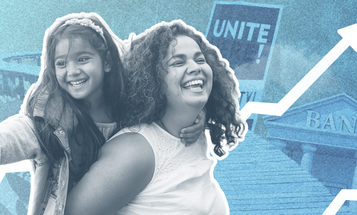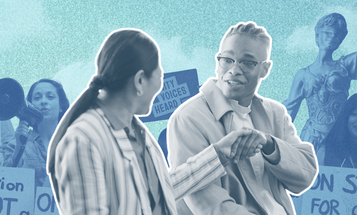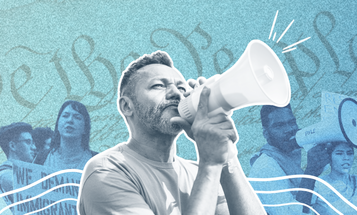
Make Caucuses More Democratic
Tomorrow's first-in-the-nation Iowa Caucuses, and their outsized influence on the race for president, raise an important question: Are caucuses paragons of participatory democracy, unrepresentative playgrounds for zealots, both, or somewhere in between?
One in seven voters faced a presidential nomination caucus rather than a primary election in 2008.
In recent weeks, The Nation's Ben Adler pointed out dramatic shortcomings in caucuses as a method of candidate selection, relying on a 2007 Century Foundation issue brief by Tova Andrea Wang (now Senior Democracy Fellow with Demos); and Adam Clymer described his growing disillusionment with the process in the New York Times.
Caucuses raise interesting and complex questions about democratic participation. The primary (excuse the pun) critiques of caucuses are that they a) discourage broad participation because of the major time commitment and other requirements they impose; and b) distort candidate choices because their self-selected participants are more ideologically extreme than even the average primary voter. These faults are often balanced against the acknowledged benefit of robust and informed participation by those who clear the hurdles mentioned above.
Caucuses are meant to be deliberative and hence are inherently time-consuming and inflexible. One must arrive at a set time and stay for hours. At base, they reward intensity of commitment at the expense of broad inclusiveness. Some people who really care will mark their calendars and block out three evening hours to attend. Others who care less will prioritize other things-a school play or a college hoops game on TV. Of course, as Tova Wang highlights compellingly in her issue brief, still others who may care just as much will be unable to attend -- people with inflexible job schedules, child care duties, physical disabilities, or anyone not in the state on caucus day, for example because of military service.
And, there is an undeniable cost: unsurprisingly, turnout is lower for caucuses than primary elections. One study suggests 22 percent lower in 2008; but even this masks how dramatic the differences can be. In the 2008 contest for the Democratic presidential nomination, caucus turnout averaged only 4.5 percent (versus nearly 20 percent for primaries), and voters in the 13 caucus states supplied only 3.2 percent of the total votes cast.
The primary countervailing value that might justify a higher barrier to entry -- and the lower participation guaranteed to result -- is facilitating "better" (read: more informed) choices by the electorate. Democracy, after all, isn't just a fair process for making decisions about self-governance; ideally it's process for making good decisions. (Another might be accounting for intensity of preferences, but that is too complex to discuss in this short post.)
There are two ways caucuses could produce better decisions. First, the voters that participate in caucuses could be more informed than primary voters -- likely as a byproduct of having to navigate a high barrier to participation. There are two problems with this. One, it's largely speculative. Caucus participants may be more conversant in the issues, or they may just be more committed partisans. I haven't been able to find any studies directly on point. Next, and much more important, we as a society have already soundly rejected the principle that we may limit participation in elections to those who are "more informed" or "have more at stake." You'll recognize these as the rationales behind literacy tests and land ownership requirements for voting in prior eras. We choose democracy because we believe that ordinary citizens have the right and the ability to govern themselves. And, any theoretical value to restricting the franchise is far outweighed by the fact that these restrictions are obvious tools for the wealthy and powerful to shunt to the sidelines anyone whose interests threaten the status quo.
The second way that caucuses might produce more informed choices is through the beneficial process of democratic deliberation and debate. This possibility cannot be dismissed quite so easily. Providing a forum for explicating and justifying one's views to fellow citizens should have a positive effect-and there is a whole field of scholarship and practice focusing on "deliberative democracy" and making the case that providing space for deliberation leads to better policy outcomes.
Of course, there are complications here too. Adherents of deliberative democracy spare no effort to create a constructive environment for debate -- where participants have a modicum of impartial information and various viewpoints are aired in a respectful atmosphere. The same standard can hardly be guaranteed at hundreds of caucus meetings across a given state, or thousands across the country.
And, there's the matter of privacy. The secret ballot is intended to prevent citizens from being bullied or bribed to vote a certain way. The most direct application was oppressive bosses and party machinists. But, privacy in the voting booth also offers refuge to those whose views may be unpopular amongst friends, neighbors, or even relatives. And, our increasingly ethnically diverse democracy throws a new wrinkle into the mix for minority immigrant populations. Imagine the cross-pressures some folks must feel -- to stick with their community, to not be seen as voting as a cohesive block -- many of whom may not feel comfortable debating their fellow citizens in English.
I have some sympathy for the romantic notion that concerned citizens should speak up in the public square. I do believe that informed deliberation can produce better results. And, the exact purpose of a caucus is enable our fellow citizens to fairly influence our votes through this type of discussion. But these notions must be balanced against the concerns highlighted above.
What of the notion that caucuses cater to extremists and produce skewed results? There's some reason for concern here. One study I found showed that caucus participants had more "extreme" views on issues than primary voters. And, legal scholar Cass Sunstein has shown that likeminded people (such as caucus voters within the same party) often adopt even more strident positions through group discussion.
But, this isn't open-and-shut. The same study reporting extreme views concluded that "both caucus and primary voters closely reflected the public overall in terms of ideological extremism." And, let's not forget that many common-sense notions today were once considered beyond the pale -- so perhaps a system that provides some space for outside-the-box ideas is healthy.
I'm not prepared to condemn caucuses without reservation. As a self-professed democracy nerd any incidence of citizens engaging each other over politics rather than American Idol excites me. And, by privileging investments of time over money (relative to primaries) caucuses may give grassroots candidates a lifeline they wouldn't otherwise have. President Obama, for example, performed nearly 14 percent better in caucuses verses primaries in terms of his vote differential over Hillary Clinton.
But, to be more fair and democratic, caucuses must be fixed.
In her paper, Tova Wang makes a compelling case for how caucuses as currently structured -- without an absentee voting option -- unacceptably exclude whole swaths of the population from participating.
Overseas for military service? Out of luck. Disabled and can't make it to the (potentially inaccessible) caucus facility? Out of luck. Have trouble speaking English? Sorry. Boss won't change your shift? Can't afford child care for three-to-four evening hours? No vote for you this year.
So, how to balance the desire to promote informed deliberation with the critical imperative of giving all eligible voters an opportunity to participate?
First, states that choose caucuses over primaries should provide an absentee voting option for those who can demonstrate a legitimate cause for not participating in the caucus. Being overseas or disabled counts; watching the Hawkeyes battle Ohio State on the hardwood does not.
Second, states should consider holding caucuses on multiple days, or at least in multiple sessions on the same day, to give the maximum number of voters the chance to participate. Sure, this will mean not everyone votes at the same time with the same information-but we've already crossed that line with early and no-excuse absentee voting, and most people agree the benefit of increased turnout outweighs the costs.
Finally, caucuses should be state-funded like primaries. This would both make the reforms above more feasible and remove the temptation for states to maintain or switch to caucuses not due to any high-minded view of their democratic superiority, but out of a naked desire to save money by shifting costs to parties.



